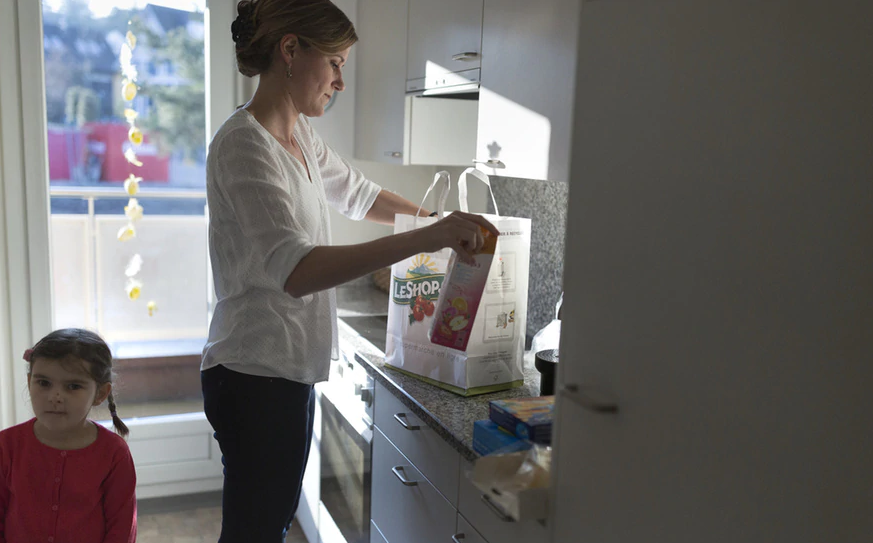
In the traditional Swiss family, the wife stays at home to look after the home and the children. This model is obviously difficult to reconcile with a professional career. © Keystone / Gaetan Bally
Swiss women are losing out when it comes to achieving managerial positions compared to their male colleagues and female peers from other countries. The common Swiss working model of women taking over childcare and men working full-time makes it harder for Swiss mothers to climb up the career ladder.
The number of women working in the private sector is continuously increasing, but most female employees still play a subordinate role. About 65% of all promotions given in Switzerland go to men, even though many women are highly qualified.
These are the findings of the 2019 “Gender Intelligence Report” published by the Competence Centre for Diversity & Inclusion at the University of St Gallen and Advance, a business association for gender equality in Switzerland. This third edition of the annual study has consolidated raw data of 263,000 employees from 55 companies. It has also found that employees working full-time are more likely to be promoted to managerial positions. The fact that Swiss women work fewer hours makes them less likely to be considered for management roles.
While 27% of women in non-management roles are not Swiss, this number increases to 39% in upper management. This shows that foreign women are more likely to secure a management role than their female Swiss colleagues.
Lorena Ortega, a Chilean engineer and mother of two working in Switzerland, relies on her family to help her balance her various responsibilities.
Staying at home – the easiest option?
The study’s researchers expressed their surprise at these findings because of the high number of qualified women in Switzerland.
According to Claudine Esseiva, president of the organisation Business and Professional Women (BPW), young couples usually do not discuss how to manage their lives before they have children. When they are faced with the decision of who takes responsibility for childcare, they usually opt for what seems to be the easiest – often the mother reducing her working hours and taking over most of the childcare. Here, Claudine Esseiva explains how she combined her roles as mother and manager:
The researchers view the strength of traditional gender models and stereotypical ideas of parenthood and motherhood as the cause for the situation for Switzerland’s working women.
“In other countries, it’s more common for children to be looked after by third parties,” says Gudrun Sander, Head of the Competence Centre for Diversity & Inclusion.
Gie Santian, a Chinese mother of three who works in risk management for a Swiss bank, has relied on daycare for her children, which she sees as more stimulating for them than staying at home with her.
Mothers work fewer hours
In Switzerland, on the contrary, it is mainly the mothers who take over childcare. This is the reason why mainly Swiss women work fewer hours and drop out of the race for management positions.
In order to change this, Swiss women would have to increase their working hours. The average employment percentage of women working for companies participating in the study was 85%. In today’s working environment, this number would have to be five to ten percentage points higher to make a difference in women being promoted to management positions. For their part, employers would have to offer more flexible working hours for parents to guarantee childcare.
Miho Habel from Japan, who opened the Geneva office of All Nippon Airways in 1997 and manages it, has always worked very long hours. She says she would not have been able to pursue her career without her family supporting her by looking after her son.
Anita Eckhardt, who is from Denmark and a member of the executive committee of the Swiss construction company Implenia, says the issues of flexible working hours and women’s participation in the workforce need to be tackled by the government.
“Steps must be taken to support families and help them organise their family lives when both parents are working,” she says.
Full story here Are you the author? Previous post See more for Next postTags: Featured,newsletter,Work

































